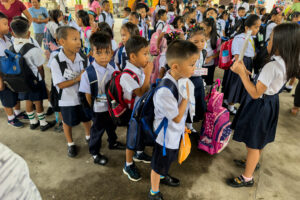THE PHILIPPINES is seeking a $150-million loan from the World Bank (WB) to improve the quality of public education amid a learning crisis.
The proposed loan will fund the Project for Learning Upgrade Support, which includes programs aimed at accelerating and recovering learning for 21.1 million learners of Grade K to 10, according to a loan document uploaded on the World Bank website on Nov. 4.
The project will also seek to improve the measurement of education quality, as well as strengthen education system capacity.
The Department of Education (DepEd) will implement the project over a five-year period starting in 2025.
The World Bank is expected to appraise the loan proposal on April 1, 2025 and give its approval on May 30, 2025.
“The most critical challenge facing the Philippines’ education system is on the current low learning outcomes. Around 91% of 10-year-olds in the Philippines cannot read and understand an age-appropriate text, which is a phenomenon known as learning poverty,” the World Bank said, noting this is much higher than Indonesia (53%) and Thailand (23%).
The Programme for International Student Assessment (PISA) in 2022 showed Filipino students were among the world’s weakest in math, reading and science, ranking 77th out of 81 countries and performing worse than the global average in all categories.
Results from the National Achievement Test also showed 85-99% of Grade 10 students do not reach proficient levels in core subjects such as math, English, Filipino, science and social studies.
“The low learning outcomes can be traced to inadequate learning conditions, as measured by teacher’s capacity, classroom environment, and availability of learning materials,” the World Bank said.
It cited overcrowded classrooms, poor teacher quality and low textbook availability.
“Additional support is needed to address the clear learning crisis that faces the Philippines’ education system nationwide,” it said.
The proposed project is aligned with DepEd’s 5-Point Agenda, which prioritizes investing in teacher quality, building classrooms, and raising education quality.
Under the project, the DepEd will implement revised learning recovery programs, review policies for teachers, and provide technical assistance to teachers for the implementation of the so-called Matatag curriculum.
The Matatag curriculum covers kindergarten, grades 1, 4 and 7 and adds subjects to improve reading, math and life skills. It was rolled out this school year, with full implementation by the school year 2026-2027.
Another subcomponent of the project includes the promotion of inclusive learning and teaching, by establishing an online teaching and learning hub and developing accessible resources for learners with disabilities.
The project will also support a review of national assessments of learning outcomes for grades 3 and 5 to ensure these are aligned with the Matatag curriculum and international standardized tests. It will also implement standardized computer-based reading assessments for grades K to 3 learners.
“It would support the development and implementation of an assessment of socioemotional skills of lower secondary education learners, as well as the administration of PISA for Schools in a small number of selected public schools,” it said.
The project will also support activities to “strengthen the education system capacity and promote decentralization,” such as the review of regulatory frameworks, improvement of accountability and enhancement of DepEd’s service delivery capacity.
The proposed project is aligned with the World Bank Group’s Country Partnership Framework (CPF) for the Philippines for July 2019 to December 2023, which was extended by a year to 2024, it said.
The Washington-based multilateral lender recently approved $1.25 billion in loans to support projects in the Philippines that aim to create a safer and more resilient school infrastructure, while also strengthening economic recovery. — Aubrey Rose A. Inosante

